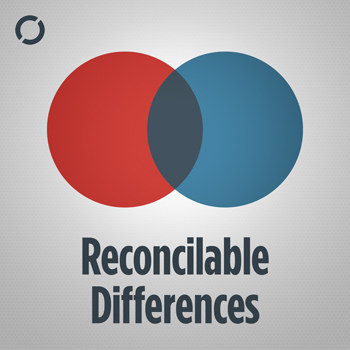Support this show
Get an ad-free version of the show, plus a monthly extended episode.#40: Slippery Slope to Dr. Manhattan
December 1st, 2016 · 113 minutes
The main topic this week is Free Will. While Merlin has concerns about bong talk and living in a fingernail, John quickly gets things refocused on people's garden-variety defenses of free will and where they probably come from.
This episode of Reconcilable Differences is sponsored by:
- Casper: Because everyone deserves a great night sleep. Get $50 off with the code ‘DIFFS’
- Foot Cardigan: Fantastic socks delivered to your mailbox every month. Get 10% off any subscription plan with the code DIFFS
- Pearl RearVision: The wireless backup camera redefined.
Stream this episode
Links and Show Notes
This week, John has follow-up from Jason the Ranger regarding the weird smell in his house.
Next up, your hosts have a few quick thoughts on the recent presidential election and the extent to which convincing voters that citrus fruits are bipeds might have changed the outcome.
Marbles and stars seem to follow mechanistic rules of the universe, but humans sure don't like things being the boss of them. John roughly specs the hardware needed to know everything that's going to happen, and Merlin wonders whether we're maybe a fact and a half from living in a medieval village.
Why don't we all just kill each other, and what if no one cared what we wanted in a new Mac? Does it matter whether people believe in free will? John's answer may surprise you (but probably won't).
(Recorded on Monday, November 21, 2016)
Amazon.com : MyKuali Penang White Curry Noodle (8 Packs) : Grocery & Gourmet Food
Treat yourself to Merlin's favorite "Internet Ramen."
Free will - Wikipedia
Hayao Miyazaki - The Essence of Humanity - YouTube
Peter Clemenza (Character) - Quotes
Unreal - On The Media - WNYC
Gríma Wormtongue - Wikipedia
His Rise to Power — Slate's Trumpcast — Overcast
Jacob Weisberg talks to historian Timothy Snyder about his most recent Slate piece, “Him,” and whether Hitler’s rise to power can tell us anything about today.
Multiverse - Wikipedia
There’s No Such Thing as Free Will
State of nature - Wikipedia
In this state every person has a natural right or liberty to do anything one thinks necessary for preserving one's own life; and life is "solitary, poor, nasty, brutish, and short"
CGP Grey - "You Are Two" - YouTube
Philosophy of Søren Kierkegaard - Wikipedia
Haufniensis uses the example of a man standing on the edge of a tall building or cliff. From this height he can see all the possibilities of life. He's reflecting on what he could become if he only threw himself into the power of his own choice. As long as he stands there he stands at the crossroads of life, unable to make a decision and live within its boundaries. The mere fact that one has the possibility and freedom to do something, even the most terrifying of possibilities, triggers immense feelings of dread.
The Reasonabilists | Parks and Recreation Wiki | Fandom powered by Wikia
Every few years, they claim the world is going to end. When the end of the world is near, they hold an all-night vigil in the park. They have said the world is going to end 15 times. Their ceremonies require the playing of flutes, much to the delight of Ron Swanson, who sells them handcrafted instruments. The Zorpies, believing in the impending apocalypse, are happy to pay high prices.
Mr. Show - "Pre-Taped Call-in Show" - YouTube
Jim Jarrett on Twitter: "@hotdogsladies @siracusa The source of a 3 week plus stench in our home. Dead red fox in crawl space https://t.co/dpsgtp1vFA"
Doctor Manhattan - Wikipedia
Reveries | Westworld Wiki | Fandom powered by Wikia
Galactus - Wikipedia
In the character's first appearance in The Fantastic Four, Galactus was depicted as a god-like figure who feeds by draining living planets of their energy, and operates without regard to the morality and judgements of mortal beings.
H. P. Lovecraft - Wikipedia
Many beings of the Mythos were too powerful to be defeated by human opponents, and so horrific that direct knowledge of them meant insanity for the victim.
